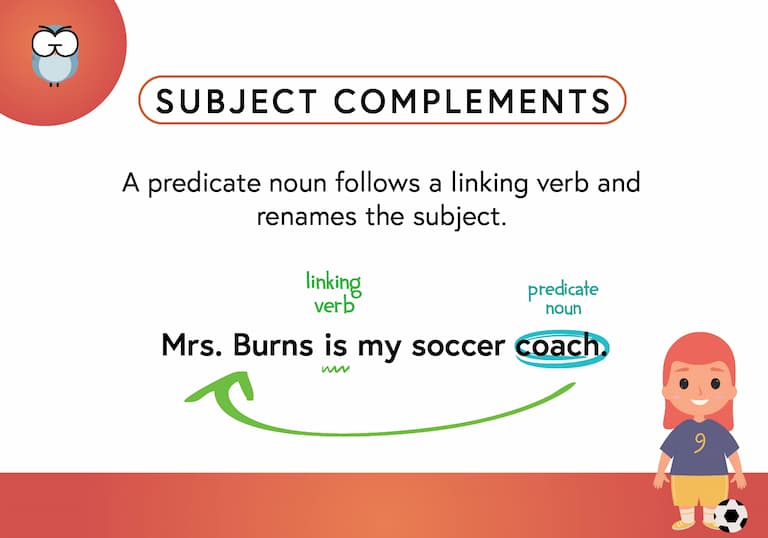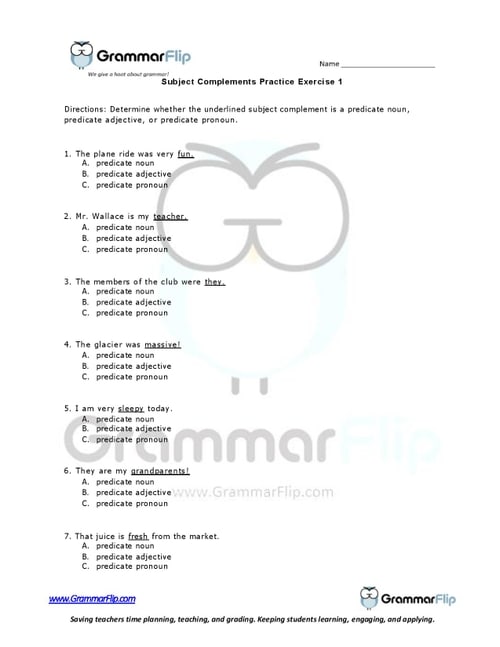What are Subject Complements?
A subject complement is a noun, adjective, or pronoun that follows a linking verb to describe or rename the subject. The three types of subject complements are called predicate nouns, predicate adjectives, and predicate pronouns.
Some examples of subject complements would be the following:
Mrs. Burns is my soccer coach.
(“is” = linking verb; “coach” = predicate noun)
My famous macaroni and cheese is extra creamy. (“is” = linking verb; “creamy” = predicate adjective)
The winner of the talent show is she. (“is” = linking verb; “she” = predicate pronoun)
Long-Form Videos: Subject Complements
Long-form instructional video lessons allow students to engage with grammar concepts in more depth and detail.
This format provides students with a stronger foundation and a more comprehensive understanding of subject complements.
Short-Form Videos: Subject Complements
Short-form videos are an excellent way to review grammar concepts. Our two-minute instructional videos help students review the concept of subject complements to further solidify their understanding.
Memorable Images: Subject Complements

The use of images to connect visual cues with concepts makes it simpler for students to grasp and remember key ideas. GrammarFlip’s memorable images create visual associations that make subject complements more engaging and easier to retain.
Definition Cards: Subject Complements
Definition cards reinforce grammar concepts by providing clear and concise explanations that students can easily reference for quick review and better retention. GrammarFlip’s definintion cards help students review the concept of subject complements to further solidify their understanding.

What to Know About Subject Complements
As mentioned above, subject complements rename or describe the subject of the sentence. Quite literally, they complement, or complete, the subject. The three types of subject complements are easy to identify in that they are the part of speech that’s in their title.
For instance, a “predicate noun” is going to be – you guessed it – a noun that appears in the predicate and renames the subject.
– She is our quarterback.
“Quarterback” is a noun, it appears in the predicate, and it renames the subject “she;” therefore, it is a predicate noun.
A “predicate adjective” is going to be – yep, again – an adjective that appears in the predicate of the sentence and describes the subject.
– That milkshake was delicious.
“Delicious” is an adjective, it appears in the predicate, and it describes the subject “milkshake;” therefore, it is a predicate adjective.
Finally, a “predicate pronoun” is simply a pronoun that appears in the predicate and takes the place of the subject.
– The criminals were they.
“They” is a pronoun, it appears in the predicate, and it takes the place of the subject “criminals;” therefore, it is a predicate pronoun.
*One extra note regarding predicate pronouns: Predicate pronouns must be in the nominative case.
But let’s be careful. Notice that subject complements are only present when there is a linking verb. Try to remember the following:
- Action Verbs have Direct Objects
- Linking Verbs have Subject Complements
One final note: Be sure not to confuse subject complements with objective complements. If you can remember that the word “complement” means “to complete,” then it should be easy to understand the difference between subject complements and objective complements. Subject complements “complete” the subject while objective complements “complete” an object (ie, direct object).
Download a Free Worksheet on Subject Complements!
Click the image below to download your free worksheet on subject complements!

Looking for a comprehensive grammar and writing program for your students?
Explore More GrammarFlip Lessons!
Parts of Speech lessons provide the building blocks of grammar. GrammarFlip covers these topics in detail to ensure a solid foundation is built. First time learners and students seeking to review the parts of speech can both benefit from the instructional videos and slide show reviews.
Parts of the Sentence lessons are critical for understanding how the parts of speech function in language construction. From the basic to the advanced, these lessons will cover a wide range of grammar topics that can be used in any grade level or classroom.
Mechanics and Usage lessons equip students with the necessary skills to communicate clearly to all audiences. With a focus on the application of these concepts in student writing, these lessons tie together both simple constructions of grammar as well as the more complex such that any age or skill level of student will benefit.


